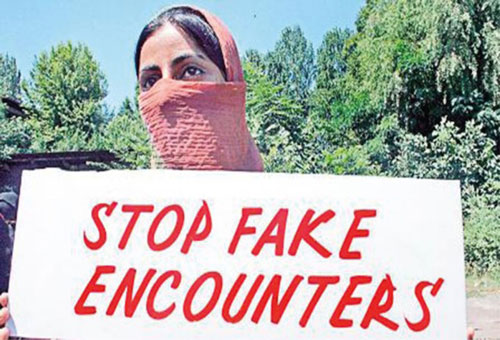Noor Humair
A few days ago, a gut-wrenching video of a girl surfaced on social media, whose father was mar-tyred at the hands of the Indian forces in Indian Illegally Occupied Kashmir, IIOK under the so-called “fake-encounters”.
She narrates how the sol-diers responded with “shameless laughter” as she agonisingly questioned her father’s death; “they laughed at me, what response can I give them? They were laughing.”
The video has prompted wide-spread rage regarding the brutal treatment of the Kashmiris by the Indian Forces and questions are being raised on the level of authority that is being practiced by these forces in the region.
This is not the first time that India has chosen to maintain criminal silence on the incident, as ram-pant extra-judicial killings, undocumented deten-tions, missing persons and widespread harassment have shown to become a norm now in IIOK.
Altaf Bhat, father of the videotaped girl, was a trader from Hyderpora, Kashmir, and was one of the four men that were killed by the Indian forces in the fake encounter.
Since October 1, 2021 around 25 Kash-miris have been killed by the forces over the alleged “fake encounters and search operations.”
Another atrocity at the hands of the IIOK re-gime was committed earlier this year in May, when a senior Kashmiri leader, Ashraf Sehrai breathed his last at the age of 78 while in police custody.
Ac-cording to his son Mujahid Sehrai, his father told him10 days before his demise that he was being denied proper medical care despite his debilitated health.
A month earlier before his father’s death, Mujahid also petitioned for proper medical care and presented it to the court but the court delayed re-viewing it and a month later his father passed away after a day of being admitted to the local hospital.
Ashraf Sehrai was just one of the thousands of de-tainees that the forces have arrested since 1989, under the Public Safety Act which authorises the Indian Forces to arrest anyone they suspect for a maximum of years, without trial.
The Act continues to be a nightmare for the Kashmiris as the forces use it frequently to suppress dissent and dodge the judi-cial system and accountability.
Modi’s government has tilted towards tighten-ing federal controls by enforcing several federal laws from the Indian Constitution.
These laws have, as mentioned before, granted residence to the non-locals who have either worked or stayed in IIOK.
If laws like these continue to be enforced, the region would soon undergo distinct demographic changes turning the native Muslim-Majority population into a minority, that too in their homeland.
This coupled with the electoral subsidy for the Hindus could prove to be a fatal blow to the Muslim dominion in the region the negative externalities of which would be detrimental to the general peace and security of the region.
Regarding the deteriorating situation in Kash-mir, Prime Minister Imran Khan met the OIC’s special envoy for Jammu and Kashmir, Mr. Yousef Aldobea lately, to stress the need for access, of the OIC and other international media outlets, to the occupied territory to probe into the human rights violations that prevail in the region.
He also criti-cised the deployment of 900,000 troops in IIOK which has stifled the everyday life and commuting of the locals.
It is distressing to know that the world still needs conventions and agreements to ensure that people caught in war need to be protected from any kind of physical and emotional abuse. Unfortu-nately, this is what the collective conscience of the world has dropped down to.
It is yet more distress-ing to believe that regardless of binding, Interna-tional laws and treaties countries continue to violate the basic human rights of those living under occupa-tion. Life goes on in IIOK; people wake up and go to work amidst echoes of gunshots that reverberate in the valley every day.
While this has become a norm for the people of Kashmir, the question re-mains, when will the world unite for the Kashmir cause and call for an effective action to secure the life and property of the innocent Kashmiris? More importantly, will the world ever unite for the Kash-mir cause at all and if not, will it be fair to witness Kashmir turn into a second Palestine right before our eyes?










